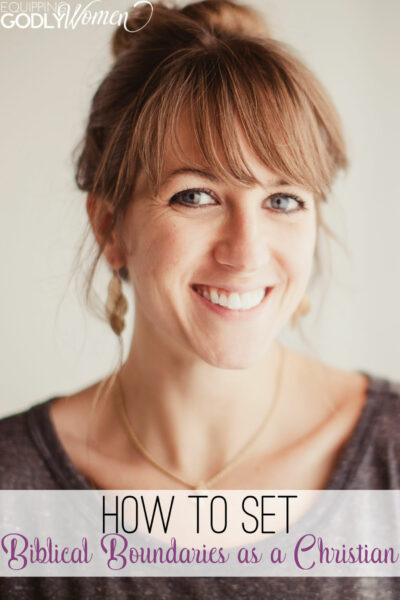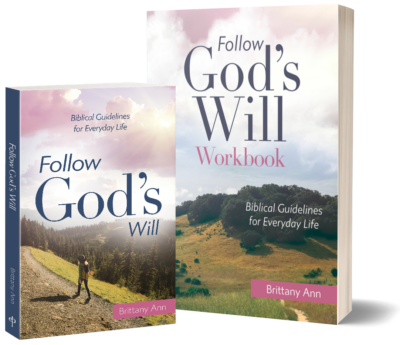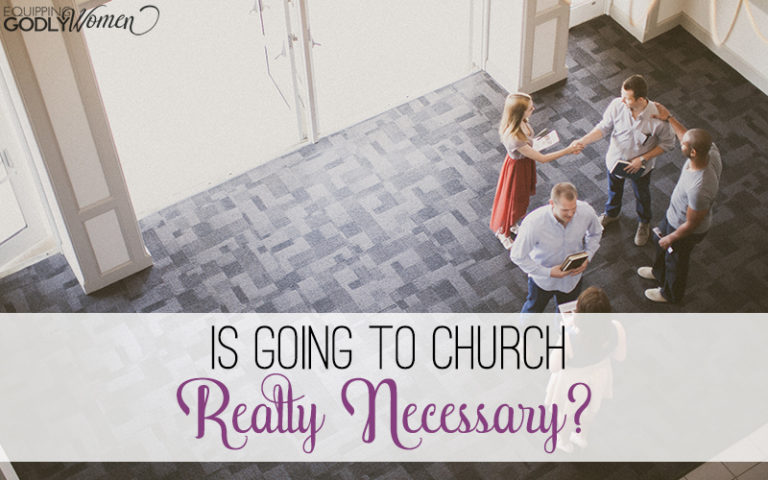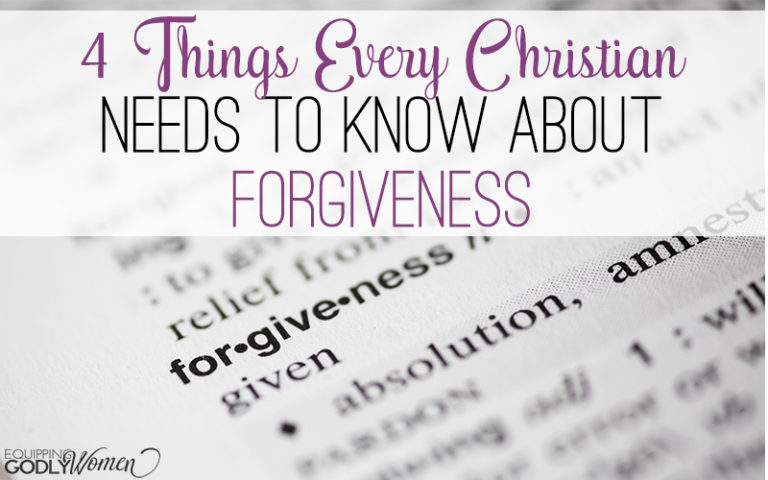How to Set Biblical Boundaries as a Christian
Tired of constantly clashing with friends/family who have no boundaries? Here’s how to set boundaries as a Christian.

Do you have a family member, friend, co-worker, church leader or even a spouse who is stressing you out with their lack of boundaries?
They might be well-intentioned, but when it comes down to it, their words and/or actions are hurting you.
As a hypothetical example, let’s say your mother-in-law has impossibly high expectations whenever you come over. You inevitably hurt her feelings almost every time you visit.
She vents to your husband, who feels stuck in the middle—and then you feel hurt that he won’t stand up for you. It’s not fair to you because she expects you to read her mind!
Related: How to Deal with Toxic Family Members Biblically
Is there a way to protect yourself from hurt, without completely breaking off the relationship?
It’s a tricky balance when you want to be humble, loving and forgiving Proverbs 31 woman, without being a doormat.
There is a way, and it’s called setting Boundaries.
Boundaries can be uncomfortable. Other people may not like them. But if we’re to follow the Bible’s example, they’re the most loving thing we can do.
*This post contains affiliate links, which means if you make a purchase after clicking through one of my links, I may make a small commission at no additional cost to you. This helps cover the many costs of running this site and allows me to help provide for my growing family. Thank you!
What Are Christian Boundaries?
Boundaries define us. They define what is me and what is not me. A boundary shows me where I end and someone else begins, leading me to a sense of ownership.
—Drs. Cloud and Townsend, Boundaries
Christian boundaries are loving limits you set in your relationships.
They help you determine which things are your responsibility, and which things are the other person’s responsibility.
As outlined in the book “Boundaries: When to Say Yes, How to Say No To Take Control of Your Life,“ God sets the example of what boundaries look like in his relationships with humanity. Starting in Genesis 1 and continuing throughout Scripture, he instructed them what to do and what not to do.
He gave them choices, and there were consequences for those choices, good or bad. Every person would then take ownership of their decisions.
Regardless of people’s choices, God has never changed in his love and his goodness. But he is very clear about his expectations.
Likewise, as godly women, we too can love other people by setting boundaries in our relationships.
Speaking of setting boundaries… The BEST resource I’ve found for figuring out how to set good, fair, Christian boundaries is “Boundaries: When to Say Yes, How to Say No To Take Control of Your Life” by Henry Cloud and John Townsend.
In this very popular New York Times bestseller, Drs. Cloud and Townsend offer a TON of great Biblical insight on what behaviors are appropriate and not, how to set boundaries, and how to stick up for yourself without being a jerk OR a pushover in the process.
If you ever wonder, “How do I set limits and still be a loving person?” “Where should those limits be?” or “How can I learn to say no without feeling so guilty,” this book will absolutely help.
I’ve recommended it to quite a few people now, and I know you’ll really enjoy it and benefit from it too. Definitely worth checking out!

What Is God’s Will for Your Relationships with Difficult People?

Have you wondered how God wants you to deal with difficult people?
Is it always God’s will that I turn the other cheek? And what exactly does that phrase mean anyway? Am I obligated to stay in contact with people who continue to hurt me?
If so, I’d love for you to check out my brand new book, Follow God’s Will: Biblical Guidelines for Everyday Life, along with the Follow God’s Will companion workbook.
Practical, encouraging, and full of biblical truth, Follow God’s Will is designed to help you answer questions including:
- What does God want me to do?
- How do I apply the Bible’s instructions to my life today?
- Where is God calling me personally?
- How can I make a difference right where I am?
- How should I navigate relationships with those who think, act, or believe differently than I do?
- And so many more!
Want to start reading for free?
Simply enter your first name and email below, and I’ll send you an exclusive “first-peek” right away, right to your inbox!
How to Set Christian Boundaries in 4 Steps
When we practice boundaries, we take ownership of four things:
- Our thoughts
- Our feelings
- Our bodies
- Our decisions
Likewise, we let other people take ownership of their thoughts, feelings, bodies and decisions, rather than taking responsibility for what really isn’t ours.
You can set up healthy Christian Boundaries in 4 basic steps.
1. Take a Brutally Honest, Prayerful Assessment
When dealing with a toxic relationship, the first thing you’ll want to do is pray about it. Be honest and tell God about your feelings (I recommend out loud or on paper). Ask for wisdom, as in James 1:5.
Here are some questions you could pray through to help you get gut-level honest.
- How are you feeling about the situation and why?
- What do you wish it could be different?
- Is the other person sinning against you? How?
You could also seek counsel about the situation, but be careful that you’re not gossiping or trying to turn people against the offender. Be discreet and seek to get input, not just vent your frustration.
2. Define Your Boundaries
Once you’ve gotten honest about the situation, it’s time to take ownership of what’s yours—and let go of what’s not. In this way you’ll define your boundaries. Remember, you’re responsible for your thoughts, feelings, body and decisions, no one else’s.
Continue to do this in prayer and with a trusted advisor, if possible.
Your hypothetical mother-in-law says you make her feel unappreciated and unloved. You know that you don’t own her feelings; she does. But she’s not following the same rules you are.
If this is a pattern, you could define boundaries in this way:
“When my mother-in-law starts blaming me for her feelings, I will apologize for anything I did that was sinful or disrespectful, but nothing more. I’ll tell her I’m trying my best and that I hope she forgives me. But beyond that, the conversation will be over.”
You might also have to explain your limits to others who are involved. In this scenario, you could say to your husband that you are not responsible for his mother’s feelings and neither is he. He might not get on board, but if you have good boundaries, that’s on him!
Related: When Your Husband Makes Decisions You Don’t Agree With
If you’re not sure what limits you should set, consider the following questions:
- Is someone blaming me for something that is their responsibility?
- What is reasonable for someone to ask of me, and what is not?
- What are my expectations from this person? Are those reasonable?
- What do I need to communicate so that my limits are understood?
3. Establish Consequences
Once you have defined your limits, you will also want to define consequences for when those limits are broken. If the other person continues to violate your boundaries, what then?
After all, it won’t do you any good to read all your favorite Christian websites, listen to tons of Christian podcasts and get great tons of awesome relationship advice if you don’t put what you’ve learned into practice in real life.
So, how do you do this, practically speaking?
This might mean removing yourself from an emotionally harmful situation. It can be a tricky line to walk, but I like to consider Jesus’ example. He said to turn the other cheek, but he also stood up to those who opposed him and walked away when he wanted to.
Consequences should be chosen prayerfully—and preferably ahead of time, so that you’re not making a decision in the heat of the moment.
Let’s say your mother-in-law always gets in a huff whenever you go to her house because you don’t put her dishes away correctly. If she continues to harass you, you have the power to decide that you won’t be going to her house if she treats you that way. The family can meet elsewhere.
This is the step that can be painful and may also require courage. But it’s also the most powerful when done in a calm and respectful way.
And don’t forget—in order for consequences to work, you actually have to follow through with them! Once you’ve made a decision, stick to it.
Related: How to Respond to an Adult Child Living in Sin
4. Reassess
A wise friend once told me that boundaries are like fences, not brick walls.
While it’s important to stick to the boundaries you’ve decided upon, you might not need to stick with them forever, and there may be exceptions.
Hopefully, once other people see that you’re serious, they might start changing their behavior.
For the sake of argument, imagine you go a year without incident with your hypothetical mother-in-law. At that point, you might consider adjusting your boundaries. Even if it doesn’t go perfectly, maybe you can be a little more flexible.
Figuring out boundaries as a Christian is hard, and you’re never really done with this process. As long as you have conflict with other people, you are dealing with boundaries.
Want to Learn More About God’s Will and Loving Others?

We are called to love others — but what does that mean when it comes to boundaries? How can we follow God’s will and take care of our spiritual health in challenging relationships?
If you’d like to dive deeper into what God’s will looks like in your life, check out my brand new book, Follow God’s Will: Biblical Guidelines for Everyday Life, along with the Follow God’s Will companion workbook.
Practical, encouraging, and full of biblical truth, Follow God’s Will is designed to help you answer questions including:
- What does God want me to do?
- How do I apply the Bible’s instructions to my life today?
- Where is God calling me personally?
- How can I make a difference right where I am?
- How should I navigate relationships with those who think, act, or believe differently than I do?
- And so many more!
Want to start reading for free?
Simply enter your first name and email below, and I’ll send you an exclusive “first-peek” right away, right to your inbox!
I’d love to hear from you: Is there a situation you need to set boundaries in as a Christian? How might these steps help?








What happens when you setting boundaries causes / allows the person to continue to make poor decisions that affect others, not just themselves? Innocent others, like children or disabled/elderly family members, or even pets?
Without getting too much in detail, I’m living in a family situation where I cannot leave due to lack of full time job. There is also an ongoing family health situation. One parent is taking care of the other, who cannot care for themselves. I am a single (not by choice), older adult living downstairs, helping as much as I can.
But the caregiver party refuses to cooperate. They refuse to do simple things like get everyone (including dog) on a schedule to have a structure to the day & not be dependent on the dog needing to go out at random times of the day. They refuse to let my sibling & I make some decisions, but also won’t make them. They are decisions that MUST be made. Refuses to get things fixed in the house to help with basic care. (Like bathroom, etc.)
We’ve tried and tried. We just get screamed at.
It’s so easy to say, “Leave them to it.” But I LIVE here. I can’t just leave them alone, knowing the parent could fall again or other things happen. It’s not the sick parent’s fault. It’s not the poor dog’s fault if she needs to use the bathroom.
This parent’s decisions – or refusal to make decisions or let us make them – affects us all, not just that parent.
I don’t know what is biblical. All I want is to obey God in this nightmare. But when you talk and reason and beg and plead and cry and the person refuses to cooperate, what can you do?
Please know I don’t expect you to solve this. It’s even more complicated than I can state in a box. I just need some biblical guidelines. It’s one thing to say “let them own it & the consequences be on their own heads.” But when one person’s bad decisions/lack of decision making harms others, I can’t just stand by & watch others suffer for it. That does not seem morally right.
Honestly, I’d really encourage you to check out the book “Boundaries” that I mentioned within the post. You can probably get it at your library. It’s very popular. It will be able to help you much more in-depth than I could in a comment box <3
I have the older copy. It’s more general & I couldn’t find a way to fully apply it in this situation.
Thanks anyway.
As the wife of a minister, I had to put some very strong boundaries in place with one of the women who attends out church. She is notorious for crossing boundaries with other people’s husbands but this time it was my husband and she was texting him at all hours of the night and often tried to visit the home when she knew I was not there and when he would be home alone. I called her on and set some stiff boundaries in place and she started telling church members that I was the person in the wrong. She even called my husband’s secular job trying to avoid my knowing that she had called and she told my husband not to tell me that she had called.
I have troubles with this word. I have read the book boundaries many years ago when dealing with family but I recently had my best friend stop talking to me. A friend told me she placed boundaries on me. As a Christian I struggle bc the Bible says multiple times to go to that person during conflict. Then take someone else with you. Then take it to the church.. I don’t see how boundaries in her eyes of no communication is healthy? I went through a bitter season over it bc I still don’t know why. I have tried to talk and there has still been no communication. I think people use this term out of context and it hurts people.
Boundaries in my marriage are there is no boundary. My husband wishes to know every wrong thought, every action if it’s dealing with my past, and everything I do basically. Our relationship started quickly so we dealt and are dealing with a lot of tribulations from that. For instance, when we moved in together, in hadn’t fully cleansed my past l, relationships, or men I was talking to etc. from every part of my life. I remember one person was friends with me on the holy Bible app, now I use it just for the book and highlights and plans, not a social media, but I moved in with my husband and I remembered that that person was still a friend with me on the app. When I had the chance, on my way home from work, I deleted the friend (he didn’t use the app anyways) because that’s my past, and my husband shouldn’t have to deal with anything that I had done before we got married. My issue is figuring out how to tighten boundaries. Any little thing I don’t tell my husband is a lie and he gets hurt so deeply to the point of not trust in me anymore. I’m faithful to him, but I know if there is things of my past, and it’s not directly effecting our marriage, that I should just remove and discard and that’s it. In my relationship it becomes a breach of trust. I don’t know how to navigate this because I want to submit to my husband and be accommodating to his desires, but I don’t know how to healthily do that. I feel guilty for any small thing and I’m confused to the point of what’s lying and hiding from your husband and what’s not now.
Yes. It is so hard to navigate a new relationship let alone a quick and new marriage. But it's clear you love your husband. Try diving into my marriage blogs and see if there is anything that might help BOTH of you figure this out together. There is tons of good stuff here.
Hi. My father, ever since my mother passed 11 years ago, has invited users into his life. The only relationships I know are not for financial gain are his long term relationships, such as children and old friends. He has forfeited his equity, his dignity and his children for others. The root of the problem is the need to be needed by women whom do not care for him in the way he wants. Because of this, he is lied to and I believe his life has been in danger for quite sometimes because he pulled a life insurance policy on himself when almost 80. Now at 85, his "girlfriend"(she has other boyfriends) has caused him to get very sick from either incompetent care or purposeful neglect for obvious reasons. He also spent over $100,000 of his equity to meet the demands of a live in girlfriend, whom later is proven to have been a serial cheat. All the while, I get the poor me's when things go wrong, and they always do. I give him advice, love and time and I am not listened to, because he keeps going back for more. TO keep my father safe, my sister and I have talked him into joining an assisted living facility. We have tirelessly set his room up and like the staff. His living alone has worried us for some time. He calls panicked at all hours, accelerated his dr. visits and basically complains a LOT. I know i have PSTD. He for such a long time told me moving from his home would kill him, but when i saw his girlfriend actually almost killing him several times, I knew I had to stop the narrative. My father knows for a fact his girl is cheating. After I got his room beautifully furnished he blew me off the following day and took his cheating girl back. I am sure she likes the facility. I am finished being confidant. I will only play daughter. I do not want to see the girlfriend(tries to turn my father against me.and he DOES go against me every time). I wish all well, but I am sick from the mental abuse. I rarely sleep Finally my father is secure in this home, He called my sister and told her what a great gal his girlfriend is. I heard and did not take the call when my turn came. It is sad when a person does not chose co-dependency but the parents huge needs and lack of care take them down the dark road. Pray I recover soon. I love my father to the moon, but I cannot fix the fact he prefers strangers to his flesh and blood and rarely acknowledges the fact his daughters are the ONLY ones not taking from him and give tirelessly.
This sounds incredibly hard to deal with. Boundaries are so hard to set sometimes but often necessary. I am so sorry!
It is interesting that the example you put for a mother-in-law and daughter–in-law — you insinuate that the daughter-in-law is in the right; the mother-in-law (too high of expectations). I am a mother-in-law who was asked and was so glad to babysit most anytime my daughters-in-law asked for a babysitter. I wish I had kept track of the hundreds of hours (perhaps thousands of hours) that I babysat free, fed meals, taught the children many things (former teacher). In both families, the children were dropped off and picked up with no parental involvement. Often the mothers dropped off the children while they were talking on the phone; the mothers never said a word. We were so in love with the children that we accepted the behavior. In many way, we were babysitters but not grandparents. (I know, we did not set boundaries. We went on vacations together and mostly took care of the children. I guess we were trying to buy the love of the children's mothers by responding to any task the presented to us.- even if it meant us canceling something we had planned. Now that the children no longer need babysitters, we hardly ever see the parents or children. We know many friends who have experienced much of the same. So please, when you are writing helpful hints, consider that both sides can be in the wrong.
Thank you for your viewpoint, Ruth. It’s always good to hear both sides and I appreciate your perspective. It sounds like you have been wonderful grandparents to your grandchildren. They are blessed to have you in their lives.
I have permanent ptsd from decades of being around people who dont know what a boundary is.My family has cut me off and my daughter has taken out a restraining order.I have been homeless and put in an institution five times because Ive been screamed at yelled at gang raped,molested,shot at and told to just get over iit that everyone has abuse in their lives.I cant go out alone without my husband,and I get lost everywhere i go.Ive been to councelors,and I have been to pastors and they all tell me we live in a sin cursed world where we have to lay down and be dooramats.My daughter is a councelor who married a sex offender.I have every reason to live in absolute terror.
I am in a struggle with my own family and my husband and I don’t see eye to eye on the situation.
My mom always had Christmas Morning at her house she was not willing to budge on that until my brother got into a committed relationship and then it was okay. Now she and my dad want to come to our home and watch my kids open gifts on Christmas Morning just as my grandparents did when we were kids. I’m okay with it because we don’t have to go anywhere and they’re not alone for Christmas. My husband was raised in a very small disconnected family and he wants us to have Christmas morning just us. I get his side too but I am stuck in an impasse. My in-laws have also been invited and welcomed to our home on Christmas morning but choose to not participate and if they do it comes with comments about how much our kids get or have so that’s a whole other argument. The whole season has become completely unenjoyable for me who used to be the Christmas junky, and with a 1 and 4 year old I feel like this should be the peak of me enjoying Christmas.
I am so sorry to hear this. It’s definitely hard when there are 2 sets of families involved with everyone having their own traditions. Reading your comment made me think of these articles that may be helpful for you: https://equippinggodlywomen.com/marriage/husband-makes-decisions-you-dont-agree-with/ and https://equippinggodlywomen.com/marriage/when-you-and-your-husband-disagree-on-parenting/. Hope you can find a compromise that works for everyone and that you have a merry Christmas!